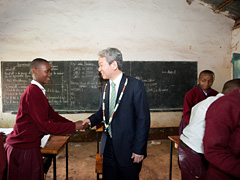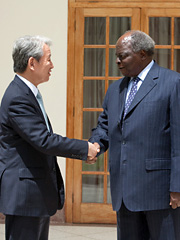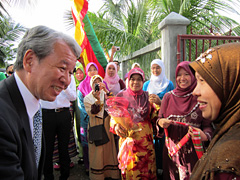President Tanaka took office in April, 2012, and in the following interview with Jica’s World magazine, he reviews his first months in office and looks to developments in 2013.
Question: Your predecessor, Mrs. Sadako Ogata, described 2011, a period which included the Great East Japan Earthquake and tsunami, with Japanese understatement, as “a very trying year.” How would you describe 2012?

President Tanaka in Tanzania
Answer: There were tremendous setbacks in 2011 so in that context we can talk during this period about recovery, reconstruction, renewal and rededication to both our aims and our ideals. It was also a period of transition. On a global scale there were various leadership changes and of course also within Japan and JICA itself. Within that context I would like to build on the achievements of Mrs. Ogata adding new ideas and initiatives wherever appropriate.
Q: In one of your first interviews after taking office you called for ‘more innovative ideas,’ expanding the application of scientific research and harnessing JICA’s cumulative knowledge.
A: Yes. This has been a major learning curve for me, but already I see a lot of clues from the past, innovative ideas which can be applied to our future operations.
Q: Such as?
A: Thirty years ago Brazil was not a grain exporting country. With Japanese cooperation it has transformed itself into one of the world’s major producers. We employed innovative technical cooperation techniques. We sent Japanese experts to Brazil and received trainees in Japan where they learned the latest techniques in such areas as seed selection and reproduction. We then provided grant aid to create a scientific laboratory to enhance agricultural production and concessional (ODA) loans to encourage small farmers to settle this barren land. It took more than two decades, but look at the result. When drought hit north America this year, grain prices increased sharply but then stabilized following Brazil’s harvest.
Q: What lessons does this have for the future?
A: We tried the combination of science and research between Japanese and Brazilian experts—technical cooperation, grant aid and timely ODA loans. This is what I would characterize as ‘the best mix’ for such projects. And now JICA is applying the same model in Mozambique where Japan and Brazil are cooperating to help that country transform its own savannah grasslands into an important food producing region.
Q: What is another successful example?
A: Thirty years ago salmon did not exist in the southern hemisphere. Then a small number of JICA experts went to Chile to work with Chilean fishery experts. There were a lot of experiments. It took two decades. But today Chile is the world’s second largest salmon producer after Norway and Japan is the major importer of that country’s salmon. Our convenience stores are full of salmon at a very reasonable price. This is a great example of development cooperation.
Q: What other lessons have you learned during your first months in office?
A: You have to take a long view to really appreciate international cooperation. Before, I was aware of ODA loans, of grant aid. I knew lists of projects. But when I became engaged in day-to-day operations I began to more fully understand the importance of feasibility studies, of preparatory work which can sometimes take months or a year. International cooperation can be dynamic but it is not simply a list of projects which can be transferred from Japan to other nations. It can be a long, complicated process and perhaps political scientists and other experts working only in universities sometimes do not grasp this reality.
Q: So international development is more complex than perhaps you first imagined looking from the outside in?
A: Yes. There are many steps to complete and follow up a successful project. There are many potential pitfalls. It is very dynamic and complex.
Q: You have already mentioned JICA’s cooperation with Brazil. There are other ‘emerging’ donors such as China and India. How is this development changing the ‘world of international development’ and Japan’s role in it?
A: The world needs to expand its efforts in the field of international cooperation and the emergence of new donors provides us with many more opportunities. Some of the targets of the U.N. 2015 Millennium Development Goals (on poverty reduction, gender equality, better health, education and jobs etc.) have been realized but others have not and so the more providers we have the better. They are very welcome.
Q: JICA already enjoys close cooperation with Brazil in such areas as Africa. Do you foresee similar cooperation with China and other emerging countries?
A: Perhaps not in the immediate months ahead but the JICA Research Institute has made efforts to increase its cooperation with the Chinese Academy of International Trade and Economic Cooperation (CAITEC) so that is a good start and we would like to continue with this research and related activities. We also have close relationships and joint activities with Korea and Thailand. I hope that our staff in various countries in the world will increase their contacts with their counterparts from such emerging partners.
Q: Various academics and experts have questioned the whole concept of development cooperation as misguided or even destructive. What is your reaction?
A: There are some negative or deficient areas of international development, of course, but there are many areas which have produced positive results and I have already mentioned several. Certainly some of the criticisms leveled at JICA are justified, but even they are useful to help us improve the quality of our own projects.
Q: Traditional donors often approach development cooperation in different ways. How would you rate Japan’s approach since the end of World War II?

President Tanaka in Kenya
A: Overall, we have done the right thing. Initially Japan concentrated on East Asia which then achieved the greatest poverty reduction of any area and the World Bank described the improvement as ‘a miracle.’ I have already mentioned Brazil and Chile. So we have been on the right track, but we probably need more research-based cooperation and more project evaluation, particularly long-term evaluation. We need to transform ‘tacit’ knowledge into practical application.
Q: You mentioned the Asian ‘miracle.’ Do you see a similar potential ‘miracle’ in Africa where JICA has been shifting more resources in recent years?
A: Yes. Yes, I do. Many African countries are showing signs of achieving those future miracles. After making my first visit to Africa recently I realize there is still a lot to be done so I cannot be optimistic without reservations. But Africa’s growth over the last 10 years is more than 5%. The number of conflicts is declining and that of peaceful transitions of power is increasing. And there are also strong prospects of increased investment by the private sector in Africa.
Q: From Japanese private companies?
A: No, not many yet. Other international companies are paying more attention to Africa and I am hopeful the private sector in Japan will also soon do the same because Africa needs improved transportation networks across borders, improved port facilities and electricity supplies. But remember, even as late as the 1970s East Asia was widely regarded as ‘the area of no hope’ and Africa today is in a far more hopeful situation than that.
Q: Japan will host a major summit conference on Africa next year, TICAD V. What are your expectations for that meeting?
A: TICAD meetings have been held every five years since 1993. We need to review what we have already accomplished and then decide what we need to do now, recognizing that the role of the private sector is becoming more and more important and we need to combine this with overall cooperation. TICAD will also be held at a time when the international community is also considering the way forward following the completion of the 2015 MDGs process so we need to ensure that TICAD activities are consistent and complementary to overall international goals.
Q: JICA has been expanding its activities in Africa for several years now. Will this trend continue?
A: I think so. But this depends on (JICA’s) budget and I am looking forward to an expansion of Japan’s ODA (Official Development Assistance) as a whole, since ODA, I believe, is one of the most important and strategic diplomatic tools for Japan.
Q: The 2011 earthquake-tsunami was one of the most momentous events in Japan’s modern history and the reverberations were felt throughout society including JICA’s development activities. But is a clearer picture now emerging about Japan’s views on such issues as ODA?
A: There is now a general appreciation among the public and politicians of the role ODA played in helping to create the conditions where many countries around the world were willing to help Japan in its hour of need. So the impact of March 11 was, in a way, a positive development for international cooperation. We now need to re-articulate and strengthen this concept of international cooperation and recognize that it works both ways between donors and emerging partners.
Q: Going forward, what are the challenges in 2013?
A: Africa will be very important. We need to have a major push there in 2013 to solidify the progress already made and the future potential. JICA is going to do a lot to take more positive measures in Africa.
Q: Where Else ?
A: Myanmar is going to be very important. Since that country began to end its international isolation JICA has been exploring areas for increased cooperation and in 2013 we will begin actual projects. We are always under pressure to begin operations but we need to do our homework and we need to do things effectively. Among other things we are planning to open a Japan Center in May there, which will be useful for local businessmen to develop their economic potential.

President Tanaka in the Philippines
Q: What is the situation in Afghanistan?
A: 2013 will be very critical. International Security Assistance forces will withdraw from the country in 2014 when presidential elections will also be held. Next year will indicate whether overall conditions will become positive or more difficult. Japan has already committed $3 billion in assistance between 2012-15. JICA is involved in various projects, particularly around the capital, Kabul, but we would like to expand our area of activities to other regions. It all depends on conditions on the ground.
Q: Your first overseas visit earlier this year was to Mindanao, the troubled area in the Philippines where the government has been battling local Muslim rebels for decades. The two sides recently signed a framework for a peace agreement. What does this mean for JICA activities there?
A: We are already very active in Mindanao. During my visit I said we were willing to expand our activities once an agreement was reached so I think we are going to work to help realize my statement. This may take various forms but if the peace solidifies we could think of much larger scale activities to connect southern Philippines to northern Indonesia and Malaysia and other countries in the region. We could conceive of a project to improve the maritime connectivity of Southeast Asia in a similar way that countries of the Mekong region are forging closer land ties.
Q: So this is an area that could encompass countries like the Philippines, Indonesia, Malaysia and even Australia and the Pacific?
A: Yes. It is an exciting prospect. Until now so-called maritime areas such as the southern Philippine islands have been disadvantaged, disconnected to the rest of the region. But we could do lots of projects there to overcome this isolation.
Q: There were several major conferences during the year: Rio + 20 on sustainable development, Cop 11 on biodiversity and the IMF/World Bank annual meetings. What did they accomplish?
A: Participating countries and organizations reinforced their commitment to international cooperation and a common vision. At Rio + 20 a commitment to a so-called ‘green economy’ was a major advance for sustainable development and poverty reduction. We held more than 100 meetings at the IMF/WB gathering where, in view of the forthcoming TICAD conference on Africa, infrastructure development including the greater participation of the private sector was a particularly important area of discussions.
Q: Food security is again an important challenge, particularly for the world’s bottom one billion people.
A: Food shortages are again in the headlines but it is an issue we are in a position to tackle effectively. I mentioned earlier the cerrado project in Brazil as one way to meet such a challenge and we are undertaking a similar project with Brazil in the African state of Mozambique. Climate change is a constant challenge but we hope this new project can take into account such problems, potential natural disasters and the vagaries of local labor markets to develop a sustainable food project.




scroll